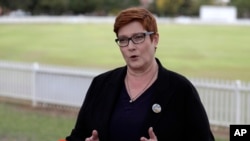As support for an independent investigation into the origins of the coronavirus outbreak grows, China said Monday such a move is premature.
Chinese Foreign Ministry spokesman Zhao Lijian said during a briefing that the majority of the world’s nations believe the pandemic is still ongoing.
A European Union-drafted resolution is expected to gain approval this week at the World Health Assembly, the governing body of the World Health Organization.
The measure calls for a probe into both how the pandemic began as well as the responses to it.
Australia has been among the most vocal proponents of such an investigation, and Foreign Minister Marise Payne said Monday it wants the effort to be “impartial, independent and comprehensive.”
“We’re very encouraged by the growing levels of support for this comprehensive World Health Assembly motion,” she said.
The novel coronavirus was first publicly identified in China in late December and has spread around world, killing more than 315,000 people and infecting at least 4.7 million.
Governments have instituted stay-at-home orders, and encouraged those who go out in public to practice social distancing and wear face masks in order to stop the spread.
Those efforts have brought economies to a halt, with Japan the latest country to report Monday that its economy slid into recession in the first quarter of this year.
With some countries, particularly those in Europe, seeing vast progress in bringing down death tolls and the rates of new infections, leaders are lifting restrictions.
Belgium on Monday allowed markets and museums to open once again, while more students returned to schools.
International travel restrictions are still in place in many areas, but popular tourist sites are also reopening, including Greece’s Acropolis in Athens and the Vatican’s Saint Peter’s Basilica.
In India, a surge in new infections has led the government to extend its nationwide lockdown through the end of the month. It reported more than 5,000 new cases and 157 deaths Monday.
Egypt is closing shops, beaches and parks during the Eid al-Fitr holiday that marks the end of the holy month of Ramadan, while also instituting a nighttime curfew.
El Salvador’s President Nayib Bukele announced a 30-day extension of his government’s lockdown order, but late Sunday the country’s attorney general filed a lawsuit alleging Bukele’s action was unconstitutional. Bukele countered on Twitter that his position gives him the power to declare a state of emergency.
The United States, the world’s leader in the number of COVID-19 infections and deaths, with about 1.5 million confirmed cases and 90,000 deaths, is gradually easing restrictions, albeit at a different pace in different regions.
On Monday, U.S. President Donald Trump is set to hold discussions with several state governors as well as restaurant executives and industry leaders on conditions for reopening. He is also expected to announce support for farmers and other members of the food chain industries who helped ensure a steady food supply during the lockdowns.
Health officials in the northwestern state of Oregon said they have acquired enough of the Ebola drug remdesivir to treat all eligible COVID-19 patients. The drug has been used in trials in a number of hospitals, and early results suggest it could speed recovery time.
And in New York state, the hardest-hit in the United States, Governor Andrew Cuomo said anyone who has symptoms or is returning to work is now able to get a coronavirus test. Many areas of the United States have struggled to carry out as many tests as health officials would want because of a lack of supplies.
